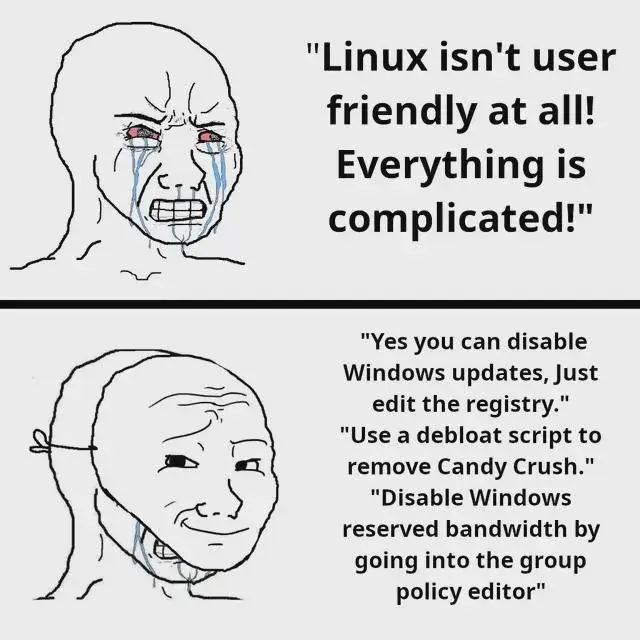this post was submitted on 07 Mar 2024
1404 points (92.9% liked)
linuxmemes
20484 readers
925 users here now
I use Arch btw
Sister communities:
- LemmyMemes: Memes
- LemmyShitpost: Anything and everything goes.
- RISA: Star Trek memes and shitposts
Community rules
- Follow the site-wide rules and code of conduct
- Be civil
- Post Linux-related content
- No recent reposts
Please report posts and comments that break these rules!
founded 1 year ago
MODERATORS
you are viewing a single comment's thread
view the rest of the comments
view the rest of the comments

Unpopular opinion: The Windows Registry, a centralized, strongly typed key:value database for application settings, is actually superior to hundreds of individual dotfiles, each one written in its own janky customized DSL, with its own idea of where it should live in the file system, etc.
Which is why I prefer NixOS (I use NixOS btw)
btw i use Nixos
The language itself has no type enforcement, the type checking is implemented within nixpkgs. This might seem like pedantry, but it really matters for things like LSPs (text editor autocomplete). I think that's what scares some people off: it's like OG Minecraft, you need to have the wiki/search.nixos.org open while you are doing your editing.
That being said, the type checking goes much deeper than what the windows registry does - e.g. it won't allow you to enable conflicting services - like grub and systemd-boot - at the same time.
claps
I agreee with you on the side of the concept, but the way it is organised and the potential values seem to make no intuitive sense (if they make any)
In gnome there's dconf
That is true.
But, due to the nature of how it works, it can be also used to hide data that the user "should not be aware of".
So can a dotfile, or any other kind of storage. There's really nothing inherently bad about the registry. Its reputation as a place to hide things in is equal parts selection bias, users' lack of technical understanding, and the marketing of "registry cleaner" apps.
But... it is a place to hide things 🤨.
I won't argue about leftovers when uninstallig, some package managers do that as well, plus it's not really the registry's fault, that's just bad or badly configured installers/uninstallers.